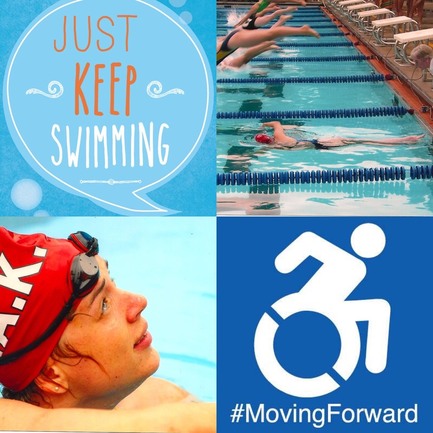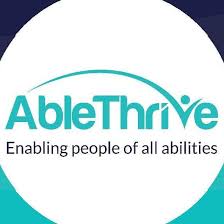 (This blog tells my family's story. To see more, click "blog" at the top of this webpage.) Beth’s wheelchair didn’t rule out anything she really wanted to do. At 17, she started a dozen college scholarship applications and competed on the quiz bowl team. She continually volunteered with different groups, including the Tiffin student athletes who visited elementary schools. A Paralympic coach asked Beth to mentor a teenager from Seattle with a new spinal cord injury. The girls exchanged emails about wheelchairs and prom dresses. At the first practice of the season for the high school swim team, I sat on the YMCA bleachers with a book in case Beth needed me. I usually put on her swim cap—after she tried to do it by herself first—and lowered her from the wheelchair to the deck. Coach Peggy competently took over the tasks. Each swimmer carried a net bag with workout gear. In Beth’s, the typical flat paddles had been cut to a smaller size to fit her hands, with the flexible tubes adjusted to hold the paddles in place. Floating aids strapped on with Velcro. She also utilized a tempo trainer, a battery-operated device the size of a watch face. It worked like a metronome from music class, clicking out the ideal pace. I couldn’t imagine a better coach than Peggy. She modified the team’s workout with creative variations to avoid too much stress on specific arm and shoulder muscles. She also supervised circle turns. Beth couldn’t flip at the wall and push off with her feet like her teammates could. To finish a lap, she approached the wall at the left side of the lane, pushed off with one hand, and completed the half circle to start another lap. “Walls are bad for me,” Beth said. The fewer walls in a race, the faster her times. High school competitions took place in short-course, 25-yard pools. A 100-yard race required three circle turns at the walls. At the end of the first high school team practice, Beth swam to a corner of the pool. With her back to the corner, she placed her hands on the low deck to lift herself out of the water to a sitting position. She tried a few times, almost making it, before being lifted out. She always needed help to get from the deck to her wheelchair and didn’t mind when the boys on the team volunteered. I caught up with her on the way to the locker room, expecting to assist. Beth decided to go it alone for the first time and declined politely. She joined the rest of the girls in the locker room. I waited impatiently in the lobby, wondering if she changed her mind. Sitting in her wheelchair, Beth lifted a knee with her wrist to raise a foot. The opposite hand guided one side of her sweatpants over the dangling foot, before shifting to do the same for the other side. With the goal of placing her feet back on the chair rest with the pants bunched up around both ankles. Eventually, she used her fists and the one finger she could control to slowly pull the sweats up and over her knees. When the pants reached her thighs, she rocked from side to side to continue the prolonged fight. Next, she scooted forward and leaned her shoulders on the back of the chair. Anchored, she lifted her bottom up a few inches to pull the sweats all the way up—inch by inch. In the meantime, the rest of her team showered, changed, and left the YMCA, I found her in the locker room with the sweatpants mostly on. Beth’s first after-swimming solution for independence? Put on baggy sweatpants over a wet suit and then leave to shower at home. Easier said than done. Next: Travel Plans!
6 Comments
 (This blog tells my family's story. To see more, click "blog" at the top of this webpage.) Managing the group home escalated my headache with less sleep and a full dance card. The base level of pain had gradually increased over a dozen years. How bad would it get? Over-the-counter medications didn’t make a dent. When I tried an opiate after surgery, I felt worse, not better. A prescription anti-inflammatory muted the headache—and increased my stroke risk. I read a study about how the brain gets wired to frequent pain signals, making it difficult to break the cycle. Obviously. I made a concerted effort to stay positive and suppress my fears of higher pain. At home, I kept up with Beth and drove her to swim practices on my evenings off. She took on new roles, unafraid, including the top job of news editor of the school newspaper, The Tiffinian. A feature in the paper titled Senior Superlatives reported on a class election that voted her most likely to be President and most likely to be rich. “I didn't want both so I gave the rich title away,” Beth said, with a laugh. The votes of her classmates also put her on the Homecoming Court, surprising her. “I was shy in high school,” Beth said. “I had more fun than most, but I wasn't a cool kid.” The night of the Homecoming football game, the Court arrived at the stadium in convertibles before lining up on the track to be presented to the crowd. A problem we didn’t anticipate handed Beth a rare defeat. “I wheeled myself everywhere, but my escort wanted to push my chair across the field,” she said, while also admitting the bumpy turf was difficult. It was a standoff on the 50-yard line, her escort equally as stubborn as Beth. She reluctantly gave in. “But I kept my hands on the wheels and pushed myself at the same time!” When the pageantry ended, Beth sat with her best friends on the platform in the student section to watch the game. Ellen and Lizzy gave her a bouquet of flowers and an adorable present. They made a Build-A-Bear and dressed it up with a fancy dress, homecoming crown, magic wand, and queen banner. They had been sure Beth would win. She didn’t, and hadn’t expected to. But... The queen bear was a sweet reminder of friends always in your corner.  (This blog tells my family's story. To see more, click "blog" at the top of this webpage.) My job as group home manager started with a bang. My new boss handed me keys and suggested I meet the residents over the weekend. If the woman on duty asked if she would be my assistant, I should tell her no. Driving to the home, I passed the pay phone I didn’t use the night of the accident, as well as the field where my car flipped three times. I knocked on the front door and entered a dark, depressing living room. Four residents watched TV while a woman crocheted in a separate room in front of another TV. Most jobs didn’t allow time for staff hobbies, including ones at group homes. I kept quiet and observed. She asked about the assistant position and when I responded, she argued. Leaving shortly after with the residents for an outing, she hit my parked car with the company van. Presumably by accident. I worked three 24-hour shifts a week including weekdays while the residents usually attended a workshop. I drove them to numerous doctor visits. I also volunteered additional time when Beth was in school. A mess of paperwork needed to be cleaned up in short order for a state inspection and the house had been neglected to the point of being unhealthy. I bleached the mold on and in the refrigerator and cleared legions of powdery bugs from overhead lights. I scoured decades of yellow wax off the kitchen floor, cleaned mice droppings out of cupboards, and threw away infested food. My mom helped me replace the wallpaper to brighten the living room. My hectic paid hours focused on the residents and improving their quality of life. I gave a pep talk at a staff meeting to enlist help to raise the bar. Thankfully, the crocheting woman transferred to another home. I aimed for a level of care I would want for someone I loved. With few staff and fewer resources, I fell short. Though I took a small measure of pride in trying. I recognized the seriousness of my responsibilities, aware of my impact on the day-to-day mental and physical health of the residents. Group home managers doubled as underpaid psychologists, nurses, and nutritionists. I expected the job to be taxing, like my earlier Tiffin Center job, where most of the residents had grown up in an institution without a loving family. The difference at the group home? Working alone most of the time. I dispensed a complicated litany of pills, my least favorite part of the job—especially when a volatile resident refused to take his psychotropic medicine. Despite behavior plans I followed, I filled out scores of incident reports. I also slept poorly three nights a week on an uncomfortable day bed. But it wasn’t all bad. Three of the residents played on a basketball team and I cheered for them at games with the fourth. Other outings could be fun, too. Sometimes. In the middle of the night, a deaf resident occasionally switched on his TV and cranked up the sound. He giggled when a sleepy worker stumbled in and out to turn off the volume. I waited to smile until after I turned to walk out of his room. Next: Beth and Homecoming! (This blog tells my family's story. To see more, click "blog" at the top of this webpage.)
I had the rare gift of time as Beth started her senior year of high school. She didn’t need me at school midday. Never bored, I protected my free hours by not turning the TV on during the day. I personalized three mother’s journals, one for each of my kids, with childhood memories and family history. I picked up needlework and writing projects, humming along to classic tunes playing in the background. I connected with Maria when she wasn’t at one of her jobs, college classes, or choir practices. Sometimes we met at Taco Bell to catch up over lunch. I called my parents on the phone and sent care packages to Ben at OSU. I walked for exercise. I met a friend for brunch most weeks at Bob Evans. When the waitress saw us approach from the parking lot, she had our iced teas ready. John never suggested I work outside the home in any way. We had enough, with his steady income and our frugal ways. But I convinced myself that I should return to a paid job for the school year until Beth started college. She gained more independence and encouraged me, assuming I wanted to work. Beth liked the idea of pushing the limits of her disability more often, and not relying on me when she was rushed or tired. I debated between a demanding job at better pay and a minimum wage job with less responsibility. With few choices in Tiffin, I decided to support adults with developmental disabilities. A job where I could make a small difference. A local agency offered me a group home manager position in a nearby town. A familiar job. Years earlier, a few weeks after my wedding and newly nineteen, I assumed the role of live-in manager at a different group home. John and I moved in before he started his first elementary teaching job. The year was 1977, during the first wave of the exodus from Ohio institutions. The best candidates for community living left first, including my four residents. Even so, the transition challenged everyone involved, every day. A few decades had passed since my first group home job, and some state institutions had closed. The exodus slowed to a trickle and included residents with multiple challenges. I accepted my new manager position on a Friday—without visiting the group home first. I hoped for the best. I could handle most anything for less than a year. Couldn’t I? Next: Overwhelming responsibilities! (This blog tells my family's story. To see more, click "blog" at the top of this webpage.) I stopped counseling since I was perfectly fine. After all, I finally made progress in the wake of three years of weekly sessions. Guilt and anxiety no longer dominated my days, which felt like a monumental gift. I scheduled dentist appointments to fix my second cracked molar, casualties of teeth clenching—despite the biteplate I wore each night. My doctor added a temporary muscle relaxant at bedtime to reduce the clenching. A high dose of Celebrex usually tempered the headache and kept me moving. I watched Beth hold a pen awkwardly in her right fist, not hesitating as she wrote her motto on a Challenged Athletes application. ANYTHING IS POSSIBLE. She wholeheartedly believed the motto was true. And it really was, though only for her and a small percentage of other people with her priceless perspective. Those with and without a disability. I filed away a note to myself that said, “Anything is possible, except when it’s not.” I intended to write about how she dismissed all she couldn’t do as irrelevant. “I think walking is over-rated,” Beth said, with a smile. Unable to stand and not focused on a far-off cure for quadriplegia, she continued to work hard to defy the usual limits of quad hands. Her spinal cord injury erased normal finger function. Even so, she wouldn’t write off any fine-motor tasks she really wanted to do. One example of many: putting her hair up in a ponytail after trying several times a day for two years. A tribute to unwavering belief and persistence. As Beth's last year of high school started, she quietly completed an early admission application to Harvard, convinced it was a long shot. “I didn’t tell anyone since I didn’t think I would get in,” she said. If someone asked about college plans, Beth mentioned the University of Michigan, one of the colleges she planned to apply to after she heard back from Harvard in December. NEXT: A new job! |
Cindy KolbeSign up for my Just Keep Swimming Newsletter by typing your email address in the box. Thanks!Categories
All
Archives
November 2022
|



 RSS Feed
RSS Feed











